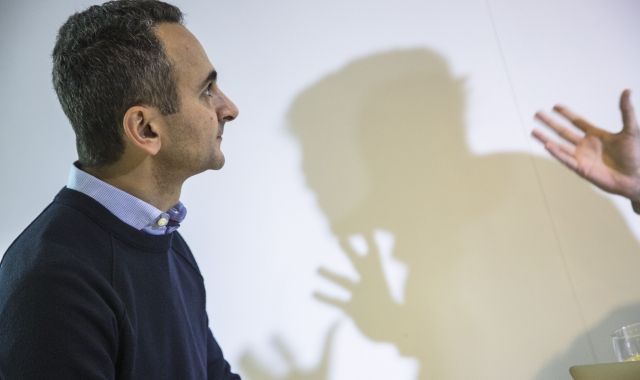
Did you know that technology also won medals in the Rio Olympics in 2016? Mounir Zok (Lebanon, 1977), director of technology and innovation of the Olympic Committee of the United States is clear: “The athlete of the future will be like Iron Man.” While awaiting the arrival of science fiction, VIA Empresa interviewed this expert, a bio-engineer by training, at the conference for sports entrepreneurs organised by Indescat and Iceb in Barcelona. According to Zok, “technology is like a butterfly that can never go back to being a silkworm.” The race for the Olympics of technology has already begun.
How does technology affect sport?
Technology is an indispensable part of our lives, we are on an unpredictable but irreversible trajectory. It is like a butterfly that can never go back to being a silkworm. Today it is unthinkable to work in the sports market without using technology that affect the experience of seeing a match, selling tickets to consume sport or helping athletes to improve their performance.
In the case of athletes, technology can optimise their performance and prevent injury. Is there a downside?
There can be if we depend too much on technology. Both athletes and coaches will tell you that a programme is successful if the ideal balance can be found between the arts and sciences of the sport. The athlete’s intuition and experience that they keep in their hearts will never be replaced by technology. In fact, it could be dangerous to eliminate it. Any programme that only looks at the data and takes decisions exclusively looking at the numbers will not work. Well-developed guidance and work that is well done can use technology to achieve results that today we would see as impossible.

Photo: Àngel Bravo
The dystopia of a robot athlete.
Exactly.
"The intuition and experience athletes keep in their hearts can never be replaced by technology"
Does technology adapt or does it force a change in routine?
Up until three years ago, athletes had to change their routines to satisfy the technology. We are now seeing a wave of humanisation of technology. Technology is no longer an abstract element that is used occasionally but has become an integral part of their lives. It has to do two things: not interfere and to talk their language. We are at a level of development in which technology perfectly matches the ways and times of training and travelling. There is no need for the athlete to adapt to the technology. We are seeing a wave of development in personalised coaching. Pedometers no longer just count steps. Imagine where the virtual coach will be in five years- time.
What will the athlete of the future be like?
The athlete of the future will have all the information needed to make the best possible decision. All we will need to do is ask them to turn up. They will be able to prevent injuries before they happen and they will know exactly where to go next. Home will no longer just be a place to rest, but also a place to maximise their success. The athlete of the future will be like Iron Man and will be able to compete better and more safely. They will know perfectly well if a street will be closed off before they get there or whether they will get to a ball before an opponent. If the athlete knows their position before making a specific movement, there is no need for anything else.
What new business models are appearing?
Thanks to technology new sponsorship and copyright models are appearing. The athlete wants to be the owner of their own brand. For example, Kevin Duran has opened a media company to manage his rights. At the same time, there are new projects like underwear that measure sleep quality or earphones that stimulate the brain. There are a lot of fans in the United States who no longer go to the matches because there are new ways of consuming sport from home. There are some companies that are working with virtual reality to allow spectators to see the match from different points of view and from home. Sports firms can already sell more tickets for a match than there are seats in the stadium. Fans are universal and the idea is to think how to monetise their experience beyond the physical structure.
"The athlete of the future will be like Iron Man and will be able to compete better and safer"
Is the fact that the United States won 17 more medals in Rio than London thanks to technology?
Success does not depend on only one factor. An athlete that is only good at managing their diet plan, their training plan or their psychological training will not achieve success. After the Rio Olympic Games, an overview was made of the previous four years. In our case, we saw that the athletes, coaches, facilities and high performance equipment were more or less the same and that the only variable at London and Rio was the technology. That was the capacity to measure performance of the place where the sport happens. The conclusion is that the technology plays a very important role in sporting success and we have to learn what we do well and what we don’t.

Photo: Àngel Bravo
Until recently technology in sport was a minority thing...
Yes, it was considered an extra to be used once or twice a week. Today, technology is as important as having a trainer or having access to good sports facilities to improve performance.
It seems like it is democratising talent...
There are elite athletes who have a great talent that can be seen in their DNA, but that is not enough. To make a paella you first need the best ingredients. It is the same in sport.
Is quality more important than quantity?
Always.
"To make a paella you first need the best ingredients"
What will change for spectators when they see a match on television?
Ecosystems need to be built around the sports technology that are attractive for large companies and investment funds. At the same time, startups need the chance to show their innovation so that researchers can turn it into real apps. That also means new models of experiences we can have from home. With virtual reality, you have access to new points of view and information about the type of game and the statistics. For example, what is the chance that Nadal aces Federer bearing in mind the set, the climate and their pulses? If you have information, you are more inclined to get involved. Your experience as a spectator will be very different from the athlete’s and the more information you have, the more you will understand how they feel.
That will also revolutionise betting...
Imagine integrating the athlete’s stats into a betting algorithm. That will make the stats vary in real time.